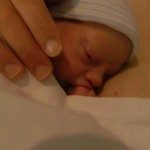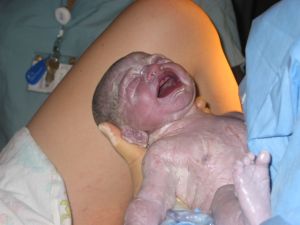By Melissa Brennan
 My name is Melissa, and I am a mama to four kiddos. I’ve been an Attachment Parenting mama since before I knew it was a phrase. For me, having the “perfect birth” with my first baby was The Most Important Thing Ever. I really can’t stress enough how tied up I was in having a perfect birth: dim lights, soft music, soft voices, at home, with just a doula and my then-husband. I would catch the baby in my arms, and we would cry and laugh, and I would heal so quickly, and life would be perfect.
My name is Melissa, and I am a mama to four kiddos. I’ve been an Attachment Parenting mama since before I knew it was a phrase. For me, having the “perfect birth” with my first baby was The Most Important Thing Ever. I really can’t stress enough how tied up I was in having a perfect birth: dim lights, soft music, soft voices, at home, with just a doula and my then-husband. I would catch the baby in my arms, and we would cry and laugh, and I would heal so quickly, and life would be perfect.
Editor’s Note: As one of the Eight Principles of Parenting, Attachment Parenting International encourages parents to prepare for pregnancy, birth and parenting, which includes informing themselves about healthy birth and birth options. API birth stories are published for the purpose of giving parents a voice in telling their birth stories, and these stories include decisions and understandings that represent various levels of understanding about optimal birth choices. The author’s description of her experiences should not be considered medical advice or representative of API Principles. Representative of the API Principles in this birth story are the pursuit of education, knowledge, and empowerment as a parent to guide the choices that suit the well-being of one’s own family.
Then reality struck. At 20 weeks pregnant, my baby was diagnosed with intrauterine growth restriction, and I was told I had a placenta previa. This meant immediate bed rest with the strong possibility of a Cesarean section later. I was crushed.
At 35 weeks, though, my spirits were renewed when the doctor found that my placenta had moved, so a vaginal birth was now a possibility. However, since my little one still wasn’t growing very well, I would remain on bed rest and would not be allowed to have a homebirth. My now ex-husband was in the Marines, and “allowed” is the exact word for how pregnancies were handled by our military hospital at that time.
No one asked about my birth preferences, but I had a printed birth plan. It is my understanding that my husband was asked about circumcision, but neither of us was asked about formula, sugar water or pacifiers. My husband was aware of my feelings about circumcision, that I preferred the baby be left intact. I explicitly stated in my birth plan that I wanted to breastfeed within an hour of giving birth and that the baby was not to receive bottles or pacifiers.
Labor came on quickly one night when I was nearly 40 weeks along. I had no pain or even real discomfort, and then suddenly, BAM, full-blown labor. I managed to call my husband, who came home from his second job, saw how very in labor I was, freaked out and called the ambulance. By the time I got to the hospital 20 minutes later, I was 7 cm dilated and fully effaced.
The hospital handled my birth in the same controlling way they handled my pregnancy:
“No! Of course you’re not allowed to get out of bed!”
“What? Why would you want to eat or drink right now? You’re in labor, get back in bed!”
“Yes, you HAVE to have an IV.”
“This is your first baby; you have no idea what you’re doing.”
That last line is what I heard when I said that I thought labor was going a lot faster than I thought it would, and I didn’t think it would be too much longer before baby got here.
Hearing those words was the final straw. I was 19. I was in horrific pain. I was tethered in bed with the IV, monitor and cables so I couldn’t get up or move. I was being talked down to. I started to cry. Then I started to yell. That’s when a nurse walked in and said, “The doctor says you can have this for the pain.” With that, she stabbed me with a needle and emptied a syringe of what I later discovered to be Demerol into my arm.
I remember I was on the phone with my mom, trying to tell her what was happening, but as I was speaking to her, the room became dark, and I suddenly couldn’t hear anything. I was blind, deaf, mute and in horrible, horrible pain. Pain was all I could feel. I passed out.
Then three things happened simultaneously: I awoke; my water broke, gushing green, smelly, meconium-filled fluid everywhere; and I screamed involuntarily.
Nurses came running, the doctor came in and everyone started yelling at me, “Stop pushing! Stop pushing!”
I gritted my teeth and yelled back, “I’m not pushing!” The baby was coming. I couldn’t stop it. I wasn’t pushing.
At that point, I reached out for my husband, who was standing off to the side in shock. I put my hand on his arm. A nurse slapped my hand away from him. She said, “He’s your husband, don’t do that to him.” My husband just stared, his jaw agape.
Then, with one tiny push (the only one I was “allowed”), out came my beautiful baby boy. And I passed out.
When I awoke four hours later, my baby had been through the hospital’s baby assembly line: immunization, circumcision, bottle of formula. (Despite my feelings, my husband made the decision to have the baby circumcised.)
I did eventually establish breastfeeding, but due to the lack of support and lactation services in the small town where we moved just after the birth, breastfeeding was very difficult. We dealt with a month of thrush, hyperactive letdown and oversupply issues. Eventually, Riley went on a nursing strike, and I ended up switching to formula.
I suffered severe postpartum depression lasting over eight months following Riley’s birth. I was in the last days of my marriage, only 19 years old and very much alone. I received no support and no help. I didn’t even know where to go for help.
I am still dealing with the emotional trauma of Riley’s birth. The hospital left me feeling powerless and small. Telling my story helps me feel like I’m doing something about it. I’ve had three more children since Riley, and each birth has been immeasurably better than Riley’s, which has definitely helped a lot.
My second birth was with Mason, a late baby born at just over 42 weeks. It required two procedures and three days to get labor started. I had a pretty aggressive doctor, and I was too overwhelmed to speak up and ask for the C-section I felt I needed. Mason nearly died at birth from complications of shoulder dystocia. He was in the NICU for a few hours, but luckily he recovered quickly and was back with me by the next morning.
I don’t compare Mason’s birth to others, because of the complications. The doctor had no way of knowing that there would be an issue of dystocia. That whole situation came down to what was necessary, and not what anyone “wanted.” I don’t feel bad about his birth or particularly good about it–I’m just thankful he survived. As far as circumcision goes, Mason’s dad and I discussed it at length, and I agreed to let him make the decision. He chose to circumcise. I am at peace with that decision because I know that someone who loves my son very much made that choice with love. While I don’t think it was the best choice, it was his dad’s choice, not the hospital’s.
My fourth birth was a scheduled early induction to avoid complications, because the doctor and I both suspected that Harry was going to be a big baby. Given the situation with Mason’s birth, we felt good about proceeding with an early induction. Labor lasted just over two hours. I asked for an epidural, but it failed, so I felt every second of those two hours. Overall, I feel good about this birth, too. And I’m happy to say that Harry is an intact [uncircumcised] baby. He just turned two and is still nursing, thanks to all of the wonderful support I received from La Leche League and the local lactation consultants.
However, I think the birth I felt best about was with my daughter, my third child. On my due date, my water broke on its own at around 10 a.m., before contractions started. I took a shower, got dressed, called the sitter, cleaned the house, and just generally took my time getting everything ready for the baby. At about 3 p.m. my husband and I headed to the hospital. I was started on some Pitocin, and things moved fairly quickly after that. I labored while moving around, walking, eating freely, drinking water and juice whenever I felt like it, with my husband holding my hand and rubbing my back. We watched movies and played cards. Labor was intense but manageable, and the nurses were happy to leave me to it. I had telemetry monitoring, so I could go wherever and do whatever I wanted.
By about 9 p.m. the pain was bad enough that I couldn’t walk or talk or move, so the nurse offered to check me. I was at a very disappointing 3 cm, so I asked for an epidural. The epidural must have made my body relax because my daughter was born less than an hour later after only two pushes.
The doctor laid her on my tummy, and they left the cord alone until it stopped pulsing. The nurses asked if they could please take her to clean her up. They had her back to me, weighed, measured, wiped down and swaddled within 10 minutes. The staff cleared the room fairly quickly, and the lactation consultant stopped by to offer support. I was given a breastfeeding kit (not formula), as well as information on renting a pump and getting an SNS (supplemental nursing system) “just in case.” After that, I was left alone with my daughter and my husband for the rest of the night.
No one questioned my authority in making the decisions regarding my care or the care of my daughter. The two interventions I had were both necessary, and I have no regrets about them. I had good friends who offered advice and assistance in the months leading up to Lana’s birth, and I had a husband who wasn’t afraid to stand up for me.
Having what I considered to be a nearly perfect birth experience gave me hope. For the first time, I stopped blaming myself for the way things went with Riley’s birth. I had always felt like somehow I was the problem in that. But I realized it was just those particular nurses and doctors.
I guess if I had to sum it up in one sentence, I’d have to say that the biggest difference was that with Riley’s birth I was treated poorly and I was the least important person in the room, but with Lana’s birth I was part of the team and the person with the most input.







